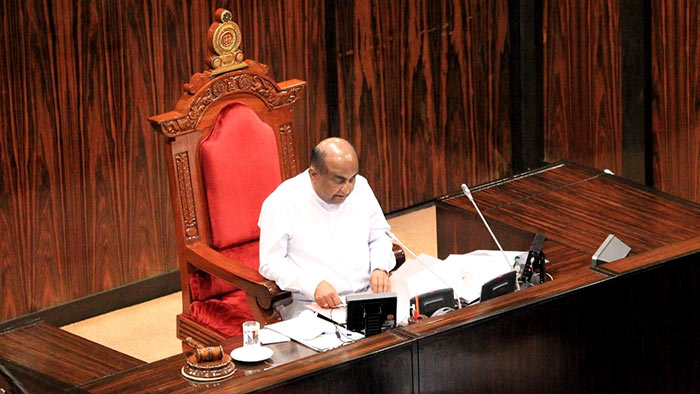Several clauses of ‘Special Goods and Services Tax’ Bill inconsistent with Constitution

The Supreme Court has determined that several clauses of the proposed Special Goods and Services Tax (GST) Bill are inconsistent with the provisions of the Constitution.
Accordingly, the Supreme Court has determined that the bill to become an Act of Parliament will be required to be passed with a 2/3rds majority in Parliament and at a public referendum.
The determination of the Supreme Court was delivered by the Speaker of House Mahinda Yapa Abeywardena when Parliament convened this morning (February 22).
Speaker Mahinda Yapa Abeywardena noted that he received the determination of the Supreme Court pertaining to the GST Bill after it was challenged under the provisions of Article 121 of the Constitution.
The Speaker said several clauses of the Bill are independently and jointly inconsistent with the Constitution.
Accordingly, the Supreme Court has said since several clauses of the proposed bill are not in line with the Constitution and proposed amendments will fundamentally change the structure bill, it will refrain from proposing specific amendments.
The Special Goods and Services Tax Bill was presented in Parliament on the 20th of January.
The Special GST Bill was presented to provide for the imposition of a special goods and services tax, in lieu of the sums chargeable on specified goods and services by way of tax, duty, levy, or any other charge imposed by law; to promote self-compliance in the payment of taxes in order to ensure greater efficiency in relation to the collection and administration or such taxes and related matters.
Speaker’s announcement to Parliament
I wish to inform Parliament that I have received the Determination of the Supreme Court in respect of the Bill titled “Special Goods and Services Tax” which was challenged in the Supreme Court in terms of Article 121(1) of the Constitution.
The Supreme Court makes the following Determination in terms of Article 120 read with 123 of the Constitution:—
(i) Clauses 2, 3 and 4 of the Bill are jointly and severally inconsistent with Article 148 read with Article 76(1) of the Constitution.
(ii) Clauses 2, 3 and 4 of the Bill are inconsistent with Article 3, read with Article 4(a) and 4(d) of the Constitution.
(iii) Clauses 2, 3 and 4 of the Bill are inconsistent with Article 12(1), read with Article 3 and 4(d) of the Constitution.
(iv) Clauses 2 and 3 of the Bill are inconsistent with Article 152 of the Constitution.
(v) Clause 9(1) of the Bill is inconsistent with Article 148 of the Constitution.
(vi) Clause 9(1) of the Bill is inconsistent with Article 149(1) and 150(1) of the Constitution.
(vii) Clauses 11(1) and 11(3) of the Bill are inconsistent with Article 4(c) read with Article 3 of the Constitution.
(viii) The Supreme Court has further stated that in view of the analysis contained in this Determination and the foregoing conclusions, and—
(a) in view of the inseparable nature of Clauses 2, 3, and 4 of the Bill;
(b) the compelling need to consider such Clauses of the Bill both individually and as a whole;
(c) as it is necessary to view Clauses 2, 3, and 4 of the Bill in conjunction with the remaining Clauses of the Bill; and
(d) the finding arrived at by the Supreme Court in Clauses 2, 3, and 4 of the Bill are irremediably inconsistent with Article 3 read with 4(a) and 4(d) of the Constitution and Articles 12(1), 76(1) and 148 of the Constitution, acting in terms of Article 123(2)(c) of this Constitution, this Court holds that the “Special Goods and Services Tax” Bill requires to be passed as required by Article 84(2) of the Constitution, by not less than two-thirds of the whole number of Members of Parliament (including those not present) voting in favour thereof and approved by people at a Referendum by virtue of the provisions of Article 83 of the Constitution.
The Court has further stated that since it would be impracticable to suggest clause specific amendments to the Clauses of the Bill that have been found to be inconsistent with the Constitution as it would fundamentally alter the basic nature and structure of the Bill and become inconsistent with the declared objectives of the Bill, the Court while exercising discretion conferred on it by the Constitution will refrain from determining the manner in which the afore-stated Clauses 2, 3, 4, 5 and 9(1) could be amended so as to alter such Clauses to become consistent with the Constitution.
I order that the Determination of the Supreme Court be printed in the Official Report of today’s proceedings of the House.
Latest Headlines in Sri Lanka
- Susantha Chandramali passes away March 1, 2025
- IMF approves $334 Million for Sri Lanka as reforms show progress March 1, 2025
- Sri Lanka President promises to end crime networks and improve national security February 28, 2025
- Warrant issued for Wasantha Mudalige over court no-show February 28, 2025
- Court orders arrest of Ex-IGP Deshabandu Tennakoon over Weligama shooting February 28, 2025



Was this Bill drafted by our Super Fin Whiz Fin Min?